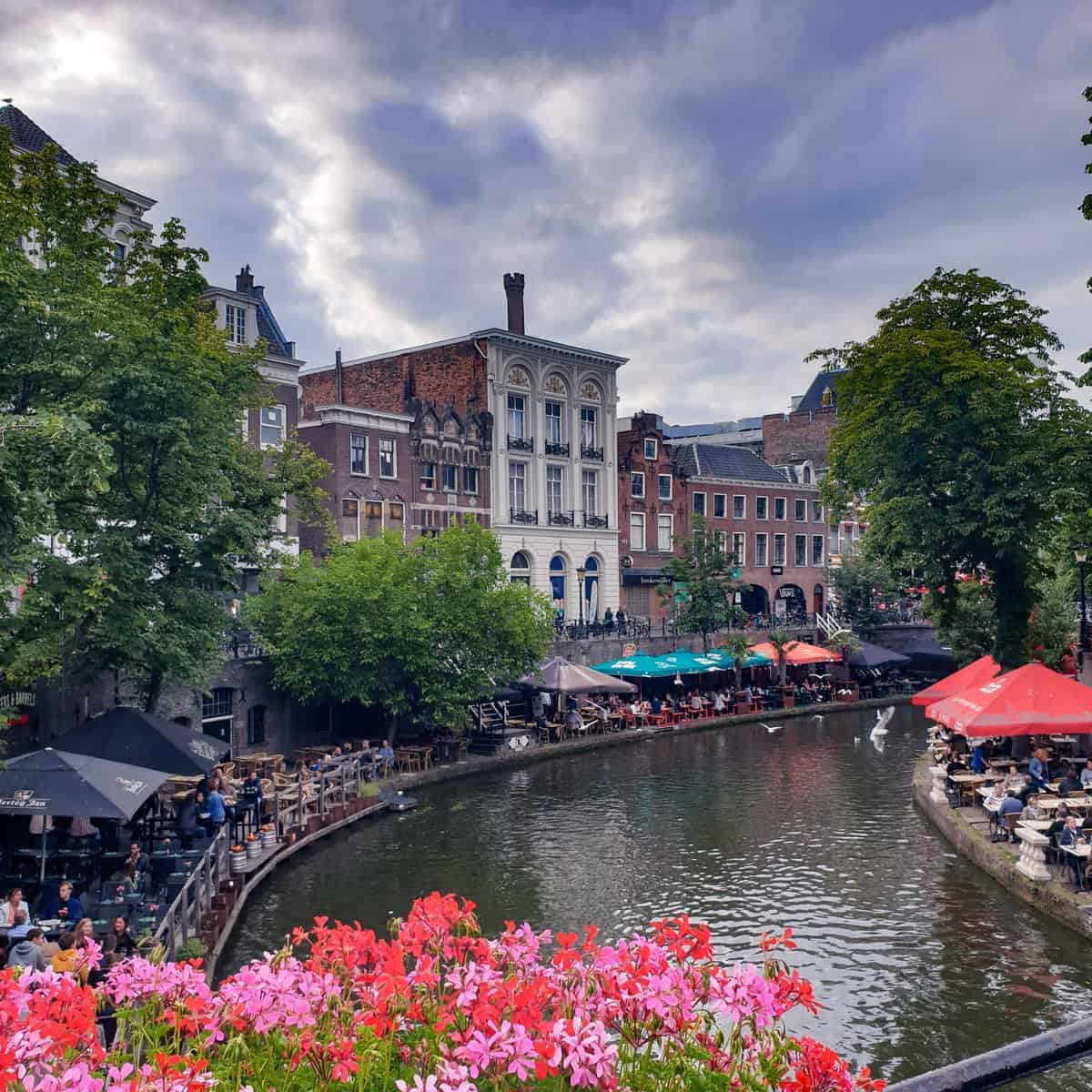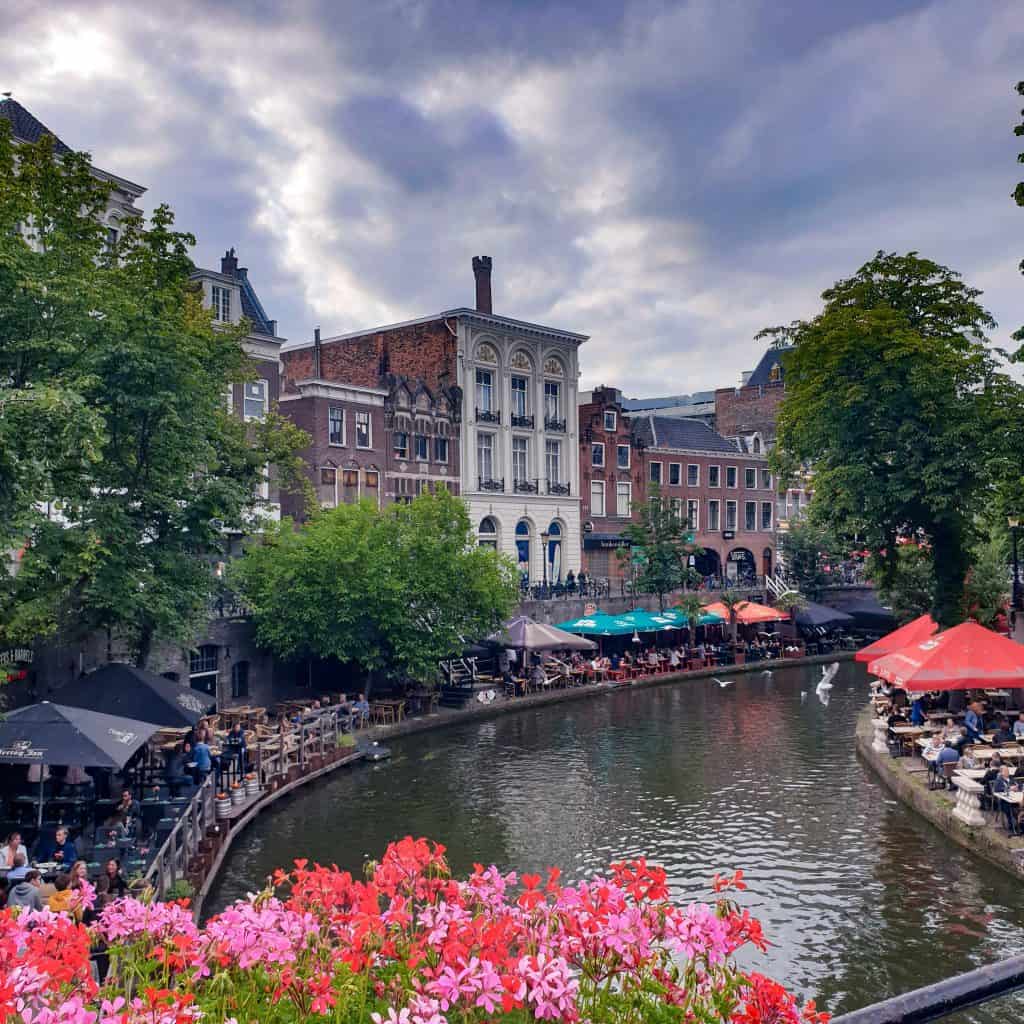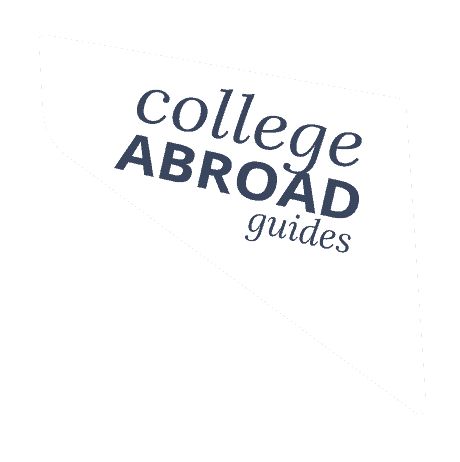What’s it Like at University College Utrecht in the Netherlands? An America-ish Experience at an Elite Dutch University

- Originally published
- Last updated on September 1st, 2023 at 02:46 pm
Table of Contents
Sure, you can hang on the quad here. And UCU boasts lots of red brick and green lawns. But that doesn’t mean Americans find everything about University College Utrecht familiar. We gathered details and student perspectives to show you what it’s really like.
University College Utrecht feels like an American campus. It’s located on a big, tree-lined suburban thoroughfare and its red brick and sprawling quad beckon students to lay down and do their reading outside on sunny days. One current student even says she’s happy she chose UC Utrecht’s liberal arts and sciences program because the campus gives it this small-scale education a homey feel.
But the three-year liberal arts and sciences program is pure Dutch, as is the concept of the “university college,” a place for in-depth, scholarly study leading to a graduate school application, but not focused on a single subject.
Considering UCU? Look into related programs at
Let’s break down the basics.
UCU Stats for Students
Associated with: University College Utrecht is affiliated with the University of Utrecht
Degrees: BA, BSc
Concentrations: Science, Social Science, Humanities, or a combination
Location: Utrecht, NL
English: All-English campus
Cost for out-of-European Economic Area (EEA): €19,500 including fees
On-campus housing cost: €670 (individual apartment on campus)
FAFSA funds: Yes
Abroad from abroad: Yes, semester programs with 50 partner universities (25 countries) are available to mainly 4th and 5th-semester students.
Exchanges offer just a few spots (sometimes as few as one or two), and students must be able to attend classes with native students in the languages that university offers. Different universities have different faculties in English, so some countries may be off-limits to students who won’t find their language or course of study covered. Accommodations can be independent or provided by the host university in dorms.
Student body: 750 students total, with 250 new applicants accepted per year out of 1000 annual applicants. They represent 70 different nationalities represented. A little under half of the students are Dutch.
Five adjectives: international, intimate, established, residential, ambitious
Something for Everyone?
This university college attracts an interesting mix of students who apply at all the big-city university colleges (Erasmus University College in Rotterdam, Leiden University College in the Hague, and Amsterdam University College) as well as students who appreciate the campus of University College Utrecht for being a little farther off the beaten path, on its own quaint campus.
“I like it more than any other school I have seen since living here because we have an actual campus with gives it a very familiar feel.”
Maybe there’s such broad appeal for this university college because it has great name recognition. UCU was the first university college in the Netherlands. It still has a reputation as being one of the top universities. It’s the most established and arguably rigorous of the Netherlands’ university colleges. For many Dutch students, University College Utrecht is proof liberal arts colleges can work.
At UCU, you’ll find broad offerings leading to a Bachelor of Arts or a Bachelor of Science. But there are even more opportunities at its parent university just down the road. Be aware: you’ll also be down the road from the city of Utrecht, which is a 45-minute walk away.
University of Utrecht PPE students’ program is housed on the UCU campus, so this small campus is more enmeshed with its parent university and the resources of bigger universities than many small UCs.
(Ready to be confused? There is also a University of Utrecht liberal arts major that is unaffiliated with UCU. Got it? Great. It’s worth checking out if you’re looking at Utrecht and unsure about the UC experience).

Is it Hard to Get into University College Utrecht?
UC Utrecht’s rate of welcoming about 25% of its yearly applicants (there are around 1,000 applications each year) to its first-year class makes it fairly selective.
At its parent university, the University of Utrecht, you’ll find just 14% of students are accepted. The university college is still an unknown entity for many students, so more spots are available—but that doesn’t mean it’s easy to stay and thrive at UCU OR at UU. Both are rigorous schools where coursework is a way of weeding out students who can’t put in the work and commitment to stay on top of their studies at the highest level.
The university colleges in the Netherlands are all moderately selective, meaning they do not accept all students who meet their criteria and for which there is space in the class. Instead, there is selective admission where just some of these qualified students will be offered an interview, and fewer still will be admitted.
he bottom line: both UCU and UU offer difficult programs at the same highly-ranked university.
Is University College Utrecht a Good University?
Yes, it’s one of the best. While there are university college rankings annually from a Dutch education site, the university colleges bounce around a little bit in rankings.
What’s more important is whether a program can offer the right combination of classes, educational opportunities, and career opportunities for you.
University College Utrecht’s parent university does rank highly across multiple fields. It’s 75th in the world overall at The Times Higher Education rankings 2022. It does worse at the QS Rankings where it ranks 120th globally. U.S. News gives the university an overall ranking of 54.
Its rankings cross various disciplines, perhaps alluding to the strengths of any liberal arts and sciences program housed at Utrecht. Utrecht ranks #29 according to U.S. News in Arts and Humanities while also standing out as a leader in cell biology, where it is ranked #30 in the world.
Two Campuses: Twice the Resources
University College Utrecht is close to its parent university, Utrecht University, on the outskirts of a metropolitan city in the heart of the Netherlands.
In fact, some UU programs are even housed on the UCU campus. You’ll find courses like the Philosophy, Politics, and Economics program here, perfectly at home in a multi-disciplinary, globally-minded environment.
“I wanted to study in Europe, so I applied to schools in Paris, Berlin, and all of the liberal arts schools in the big cities like Utrecht, Rotterdam, Leiden, and Amsterdam. I like it here best.”
The campus’ academic buildings are a mere 20-minute bus ride from downtown Utrecht and the larger University of Utrecht facilities (ten minutes by bike).
At the University College, academics are housed in four main buildings on the “international campus” on the east side of Utrecht.
This gives students access to the facilities, like gyms, sports venues, libraries, and museums, of a large university with the cohesion of a small one. The downside is that university facilities are in the city center while most of the day-to-day of collegiate life for honors college students is not.
“Students find themselves meeting people from around the world, and making connections and friends that transcend culture.”
University College Utrecht Accommodation
Students must live on campus in student housing for the first two years of their three-year degree.
This means that students at UCU who are living and studying with one another for their first 2 years have a great idea of who they want to live with during their third year. Therefore, they have a relatively easy time moving into studenenhuizen (student houses off campus) with people they know they’ll get along with.
But a true bonus in a tight student housing market nationally, the college requires and guarantees students live on campus for their first 2 years. Students have their own private rooms in apartments with 4-6 students and shared kitchens and bathrooms.
“Students, of course, go out to meet others. They usually get to know others outside their program by being in student accommodation or being in classes with people from other programs, then meeting them at parties and clubs.”
Rooms are not segregated by department, nationality, year, or gender, since the college wants to support an integrated liberal arts experience.
Campus Hotspots
One cool aspect of UCU is that part of the campus is located on the “Kromhoutkazerne,” a former military installation on the outskirts of town.
The student dining hall building, where study areas, the Jazzman’s café, and the Academic Student Council are located, was once the military mess hall and the auditorium used to be a military museum.
On campus, there is a student volunteer-run bar, the UCSA College Bar, and a student organization that plans excursions, parties, and sports for students. Nearby Wilhelmina Park, close to campus, is a good spot to try your hand at flunkyball.
Grab some friends for this German drinking game where teams face off and try to topple a central water bottle to gulp beers as fast as possible before the opposing team retrieves the ball and resets the bottle.
Hitting the Books in the Liberal Arts Program
University College Utrecht’s 3-year liberal arts and sciences program is fairly open for students to decide the course and coursework their education will take.
There are more distribution requirements than required core courses. What does that mean? Well, First-year students will take some required academic skills courses and a foreign language. Eventually, students will take tracks in interdisciplinary studies areas.
By that by the time they graduate, they’ll have amassed multiple areas of expertise and some familiarity with working on core issues across disciplines. For example, students may go deep on biology. They may hypothetically focus on about dating techniques for paleolithic plants, and combine that with archaeology and history for a well-rounded understanding of how to approach a study of ancient ruins.
The highly personalized education and critical thinking they undertake helps them stand out in their areas of expertise, no matter which disciplinary lines they cross to get there.
Are you a know-it-all looking to crush future pub quiz competitions with your knowledge of medieval history and current physics breakthroughs? This is the program for you.
Academics Made Flexible
Utrecht was the first public university college established in the Netherlands and was the king of the hill when it arrived on the scene. Now, there are other honors offerings, but UCU still commands respect in the job market in the Netherlands as an established, academically rigorous alma mater.
University College Utrecht guides students through course selection in its three core areas by assigning them an advisor (called a tutor) to stay on top of planning their four classes each semester.
The college requires more mandatory coursework than University College Roosevelt, also a university college established by the University of Utrecht.
However, the premise of the university college program is similar: students spend most of their time in their second and third years developing depth in liberal arts areas that contribute to a greater understanding of the problems they hope to address in their future careers.
The three broad areas are called “domains” at Utrecht, rather than departments or faculties. There are 230 total classes offered, so students will ultimately choose upwards of 20 of them from which to sculpt a unique academic experience.
“You develop an intimate bond with those in your study program, which is nice.”
Examples of Concentrations and Combinations
At UCU, they follow their own amalgamation of coursework in social sciences, humanities, or sciences contributing to depth in two areas, which may cross domains. For example, a budding art historian might make up a major entirely within the humanities domain, specializing in both art history and museum studies.
Another student may combine cognitive neuroscience from the science domain with psychology from the social sciences domain, aiming to graduate with the depth of knowledge required to address traumatic brain injury. Both routes are perfectly acceptable.
Requirements stem from configuring a student’s concentration area. For example, if following a humanities course, students will not need a math “gen ed” class, but will be required to take a logic-based “humanities lab.”
“If I had to choose, I’d call UU dynamic, innovative, supportive, and adventurous for supporting students to be unafraid to try new things.”
Academic Opportunities You Won’t Get Anywhere Else
Standout special programs also draw students wanting to work in these areas.
- A double major 4-year programs in Dutch law or Physics.
- A special program in Cultural Heritage helps place museum studies students in internships like the Rijksmuseum in Amsterdam and the British Museum in London.
- An East African program arranges internships in Kenya and Tanzania. There is also an option to follow an entrepreneurship minor, a premed science major, or take sustainability courses.
Enhance these opportunities with bachelor’s thesis fieldwork on the Caribbean island of Aruba – all UCU students interested in island issues can take a course to get coaching on how to design their own research there.
There is also credit-awarding opportunities for students wanting to work on issues affecting China, to do a mental-health-in-Jamaica trip, to take a sign language summer course, or do a community thesis research project.
Overall, UCU has massive curricular project offerings and partnerships, offering students a variety of ways to enrich their academic experience.
University College Utrecht Students
University College Utrecht students come from upwards of 70 countries and make the university college campus a unique place. Students expect and value its international experience.
“In regards to UU, students can find themselves meeting people from around the world, and making connections and friends that transcend culture.”
The university staff bakes global experiences into the curriculum, along with a hefty dose of diversity and inclusion.
That stems from the multi-disciplinary environment that permeates campus academically and socially.
“I think UU students are proud of the University’s good reputation for research, and strive to uphold and maintain it in many ways, as well as its ability to shape talented minds. I think UU is a innovative university, not just in a research sense but also in the ways it tries to help students and support them, its also one not afraid to try new things, while at the sake time cherishing the past.”
However, a typical complaint about all the university colleges in the Netherlands is that many Dutch students attend them for the international community. Others sign up because they are rigorous honors colleges. That can mean that not everyone’s in it for the global and academically-minded experience. Stereotypically, Dutch students hang with Dutchies, and international students mix with other internationals.
What’s the Application Process Like?
American students without an International Baccalaureate degree will need four AP exams with a score of four or five.
Use your motivation letter to express why you’re into the liberal arts environment and the international climate on campus.
This is a place for students who value a broad academic inquiry, who want classmates who come to class discussions from different perspectives, and who are comfortable in English, since the social life of the campus will also center on finding common ground with students from around Europe and the world.
Netherlands’ Studielink website provides an admissions portal for transcripts, one reference letter, a letter of motivation, and, if applicable, English proficiency scores and financial aid documents.
If applying for a scholarship, complete your fall enrollment application by December 15.
January 1 is the early bird application deadline, with decisions mailed before March.
February 1 is the “regular” deadline, with students hearing back before May. The sooner you apply, the sooner you’ll hear back. The college encourages early applications.
There is also a September 15 deadline for spring admissions. Some applicants will be invited to an interview with a current instructor about their academic interests.
There is a UCU Fund for non-EU students that awards at least one full scholarship and multiple partial scholarships based on financial need.
Check out the Rest of the Netherlands
Want to know more about going to school in the Netherlands? Start with the basics, and don’t forget to dive into how to choose between university colleges in the Netherlands.
Related Posts

Jessica Share
Jessica is the writer, Ph.D., and mom-of-an-abroad-student-in-the-UK at the helm of College Abroad Guides. When she's not asking college students where the coolest place to hang out in their city is, she's figuring out how she can make $60 imported Greek oregano potato chips and £50 British bacon potato chips appear on her doorstep for the cost of a local bag of Lay's.





